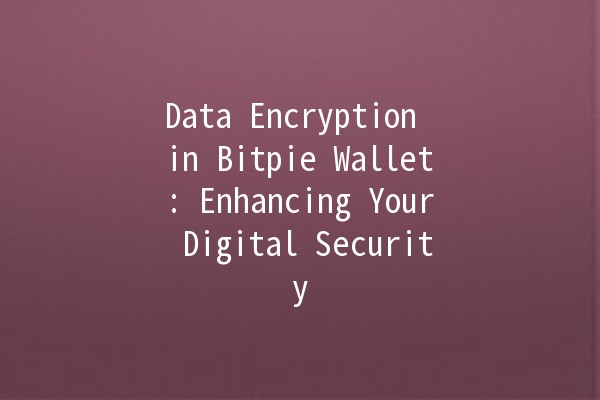




In the world of cryptocurrencies, digital wallets serve as crucial tools for storing and managing your assets. Among various options available, Bitpie Wallet stands out with its comprehensive data encryption capabilities. This article delves deep into the encryption mechanisms employed by Bitpie Wallet, offering practical tips for maximizing your digital security. With a focus on user engagement, we’ll highlight five effective strategies that ensure enhanced protection for your crypto holdings.
Data encryption is a complex process that converts information into a coded format, making it indecipherable to unauthorized users. This ensures that sensitive data remains confidential, preventing potential breaches and theft.
Bitpie Wallet utilizes advanced encryption technologies to safeguard users' cryptocurrency data. By employing secure encryption algorithms, the wallet protects sensitive information, including private keys, transaction details, and personal data.

Explanation: Implementing 2FA adds an additional layer of security beyond your password. This process involves sending a verification code to your mobile device, which you must enter to complete the login.
Application Example: Many users link their crypto wallets to SMS or authenticator apps. By enabling 2FA within Bitpie Wallet, you significantly reduce the risk of unauthorized access.
Explanation: Keeping your wallet updated ensures you benefit from the latest security improvements and bug fixes. Developers continually work to patch vulnerabilities and enhance encryption protocols.
Application Example: Set your Bitpie Wallet to autoupdate or schedule regular checks for new versions. This practice helps safeguard your wallet against known threats.
Explanation: A strong password is critical for protecting your wallet. It should contain a mix of letters, numbers, and special characters, making it difficult for hackers to guess.
Application Example: Consider using a password manager to generate and store complex passwords securely. This way, you avoid reusing passwords across different platforms, which could lead to vulnerabilities.
Explanation: Regularly backing up your wallet data ensures that you do not lose access to your funds in case of hardware failure or loss of your device. Backups allow you to recover your wallet and assets without hassle.
Application Example: Use a secure external storage device to save your wallet backup files. Additionally, you can write down your recovery phrase and store it in a safe place.
Explanation: The cybersecurity landscape is constantly evolving. Staying updated on the latest trends and threats allows you to adjust your security practices accordingly.
Application Example: Follow reliable news sources, blogs, or forums dedicated to cryptocurrency security. Engaging with the community can provide insights into emerging threats and effective countermeasures.
Data encryption is vital because it ensures that your sensitive information remains confidential. In the context of cryptocurrency wallets, it protects user information from theft and unauthorized access, providing peace of mind to asset holders.
Bitpie Wallet employs advanced encryption methods to secure private keys. By using AES and ECC algorithms, the wallet protects these keys from malicious actors, ensuring that only authorized users have access.
Yes, as long as you have backed up your recovery phrase or wallet data. This recovery information allows you to regain access to your wallet, even if you forget your password.
Absolutely! Bitpie Wallet offers a userfriendly interface that makes it easy for beginners to navigate. Additionally, its robust encryption features provide a secure environment for managing cryptocurrencies.
Bitpie Wallet securely stores your data locally on your device. It uses encryption to protect sensitive information. This means that you retain control over your data, reducing the risk of potential breaches associated with cloud storage.
If you suspect any unauthorized access to your wallet, immediately change your password and enable twofactor authentication. You should also alert your contacts and consider moving your funds to a new wallet as a precaution.
Data encryption is critical for safeguarding your cryptocurrency assets, and Bitpie Wallet excels in providing robust encryption mechanisms to ensure your information remains secure. By implementing the tips outlined above, users can enhance their digital security and better protect their investments.
The world of cryptocurrency can be fraught with risks, but by staying informed and taking proactive steps to secure your wallets, you position yourself for a safer and more secure crypto experience.
Are you using Bitpie Wallet? Share your experiences and security tips in the comments below! Your insights can help others in the community enhance their security practices.